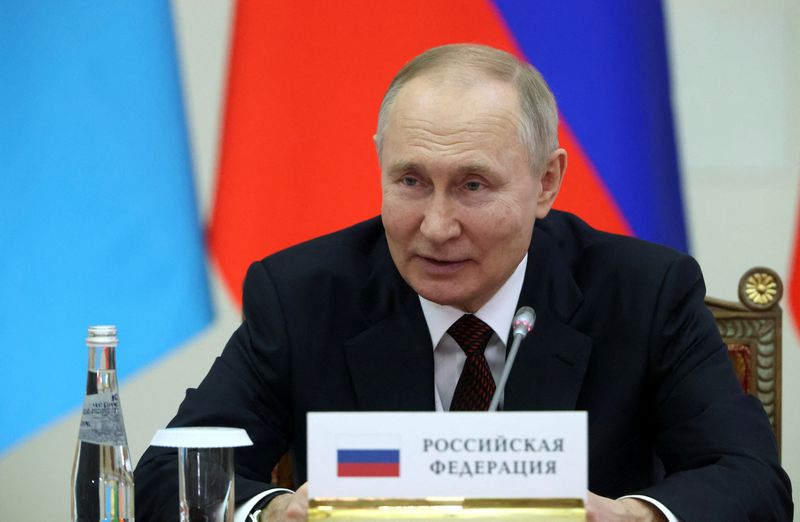By Alexander Marrow and Vladimir Soldatkin
MOSCOW (Reuters) -President Vladimir Putin on Tuesday delivered Russia's long-awaited response to a Western price cap, signing a decree that bans the supply of crude oil and oil products from Feb. 1 for five months to nations that abide by the cap.
The Group of Seven major powers, the European Union and Australia agreed this month to a $60-per-barrel price cap on Russian seaborne crude oil effective from Dec. 5 over Moscow's "special military operation" in Ukraine.
The cap is close to the current price for Russian oil, but well beneath the windfall price Russia was able to sell for this year and that helped offset the impact of financial sanctions on Moscow.
Russia is the world's second largest oil exporter after Saudi Arabia, and a major disruption to its sales would have far reaching consequences for global energy supplies.
The decree, published on a government portal and the Kremlin website, was presented as a direct response to "actions that are unfriendly and contradictory to international law by the United States and foreign states and international organisations joining them".
"Deliveries of Russian oil and oil products to foreign entities and individuals are banned, on the condition that in the contracts for these supplies, the use of a maximum price fixing mechanism is directly or indirectly envisaged," the decree stated, referring specifically to the United States and other foreign states that have imposed the price cap.
"The established ban applies to all stages of supply up to the end buyer."
The decree, which includes a clause that allows for Putin to overrule the ban in special cases, stated: "This...comes into force on Feb. 1, 2023, and applies until July 1, 2023."
Crude oil exports will be banned from Feb. 1, but the date for the oil products ban will be determined by the Russian government and could be after Feb. 1.
WIDER DEFICIT
The price cap, unseen even in the times of the Cold War between the West and the Soviet Union, is aimed at crippling Russian state coffers and Moscow's military efforts in Ukraine.
Some analysts have said that the cap will have little immediate impact on the oil revenues that Moscow is currently earning.
However, Finance Minister Anton Siluanov said on Tuesday that Russia's budget deficit could be wider than the planned 2% of GDP in 2023, with the oil price cap squeezing export income, an extra fiscal hurdle for Moscow as it spends heavily on its military campaign in Ukraine.
Russia has been promising to respond officially for weeks, and the eventual decree largely established what officials had already said publicly.
The G7 price cap allows non-EU countries to continue importing seaborne Russian crude oil, but it will prohibit shipping, insurance and re-insurance companies from handling cargoes of Russian crude around the globe, unless it is being sold for less than the price cap.
EU countries have separately implemented an embargo that prohibits them from purchasing seaborne Russian oil.
Russian Urals oil traded above $56 per barrel on Tuesday, below the price cap level.
Brent crude oil moved a little higher on the news and was up 1.4% at $85.1 by 1743 GMT.
